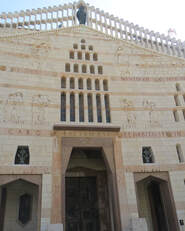 the Resurrection of Jesus sanctifies the present the Resurrection of Jesus sanctifies the present Stories are often far more impactful than detailed explanations, no matter how brilliant or deftly made. Because they are so effective I shared a short story with my Christian Spirituality classes to help them with a particular concept. The tale took place on a chess board, and all of the personified pieces were either caught up in yesterday or were obsessing about tomorrow; that is, until a unique character arrived to help them change their perspective, resulting in a joyful embracing of ‘the now.’* While the story was rather silly, the point was clear: being attuned to the present is essential to living a spiritual life. Just as we followed the footsteps of Jesus moment by painful moment to the Cross during Lent, after the Resurrection we follow His directive to bring the faith to the ends of the earth, looking toward eternal life, building up the Kingdom in the here and now. In other words, the Resurrection of Jesus and the graces that go with it sanctifies the present, the now, so that each moment contains the power of His love and mercy guiding His disciples in this life with an eye toward the next.  prayer is a conversation with God prayer is a conversation with God Staying in the present is not as easy as it sounds, however. We are imperfect and our minds tend to wander, especially in this era in which there is a tremendous amount of information and stimuli available that attempts to entrap our attention. Especially difficult is the temptation to dwell on the past or to fixate on the future, tendencies which hinder our effectiveness as disciples. It is one of the reasons we have difficulty during prayer. Distractions often arise because our minds are somewhere other than in the present, contributing to the idea that we should just give up on prayer altogether. During spiritual direction sessions I have (on occasion) heard something like this: “I am not good at prayer. I do nothing but struggle.” The first issue is that we should never judge our prayer or the content of it. Prayer is a conversation with God, and He certainly is not judging it, so why should we? As for distractions during prayer, we all face them. I read somewhere that St. Teresa of Avila once said, “If you have distractions during prayer, it means you are alive.” It is true that distractions are a normal part of our humanness. But in order to deal with them we need to recognize that just about all of our distractions arise either from the past, such as memories that plague us, or from things we need to do, (or are hoping to do), in the future. These concerns need to be put into God’s hands so that we can be attentive to the present as He is speaking to us now. Simply put, we cannot be attentive to the movements of the Holy Spirit if we aren’t ‘here.’ **  we need to trust God and follow His call we need to trust God and follow His call Most of what ails us, so to speak, is a result of being unaware of the graces provided in our current moment. God is found in ‘the now;’ in truth, the only thing we can control in life is our response to Him in this moment. The past is over, though we can learn from it, rejoice in it, and God can heal it if need be; but we cannot change the reality of it. The future is not assured; and most of the time when it arrives, it is not what we had expected anyhow. However, while making plans is prudent, we need to trust God and follow His call, something which requires opening ourselves to Him. As in all our relationships, the only way we can grow is by being attentive to the other in the present moment. If we dwell in the past or future, we are not truly paying attention to them, but rather, we are only paying attention to ourselves.  an intimate encounter with the Living God an intimate encounter with the Living God Similarly, being attentive to the present moment will enliven our liturgical worship, particularly in how we receive the Word and the Eucharist. When we hear the Word we must not be tempted to think of it as a recitation of someone else’s past. It is our past, and it offers great insight; it is God’s message of love and mercy, made manifest in our present lives. And if we get distracted by the past or the future while participating in the Eucharist, (a sacred gift which should evoke reverence and awe), falling into a routine of receiving without being truly present to Christ, then we will miss an intimate encounter with the Living God who desires an intimate encounter with you.  life to the full life to the full We cannot hear God’s voice if we are not attentive to Him, and if we do not listen to Him, we cannot serve others effectively either. When we work at the habit of staying in the present, it will not only facilitate greater attentiveness to others, but it will also help us to become more self-aware; that is, we need to listen to what is going on within ourselves, too. Jesus came that we “might have life to the full.” (John 10:10, NIV) Living life to the full is about finding Jesus in the present moment, like Mary Magdalene at the empty tomb on Easter morning. She recognized Jesus when He pronounced her name, drawing her from the mourning of the past into the joy of the present. The Good News is that we, too, are called to nothing less than to encounter Jesus in the same way.  pondering what we receive in each moment pondering what we receive in each moment May we ask for the grace to be attentive to Jesus in the present! May we become less centered on self and more on others by being fully with them! And may we seek to be like Mary our Mother, in pondering what we receive in each moment so that we, too, may be able to say, "Your will be done!" Let us meet in this present moment in the Heart of our Risen Lord Jesus! Peace! ©Michele L. Catanese *Twelve and One-Half Keys: Parable-Stories for those on a Mystic Journey, by Edward Hays, pages 65-72 **In general, most distractions hold us back from finding Jesus in the present moment of prayer. While some distractions appear to be random thoughts, distractions about the past might be an indication that we need to let go of something, or they can be an indication that we are in need of healing, whether it is something large or small. Thus, these concerns can sometimes be an invitation from the Lord to bring them (to Him) for healing. If it is some past failing that comes up, it can be a temptation from the enemy that is designed to keep us from progressing in the spiritual life. But Jesus offers mercy and freedom and whatever graces we need if we ask. (The Sacrament of Reconciliation is suggested for this, too.) If the distractions are about things we need to do in the future, we can pray for the grace to fulfill the task, ask God to heal our anxiety, teach us to trust in Him more, or something along those lines. We need to face the distractions head on, talk about them with God, listen for the movements within our heart that come from the Holy Spirit, put our cares in the Lord’s hands, and then move on in the prayer. And note that praying about some things is not a ‘one-shot deal:’ issues in need of healing and lessons to be learned take time. These issues can best be discerned and attended to with the help of a certified spiritual director who is trained in the practice of guiding people through these things. (By the way, one of the reasons we begin prayer with the Sign of the Cross is because the gesture is an acknowledgement that the time of prayer is not the same as what came before, intentionally inviting God to open our eyes to His presence as Father, Son, and Holy Spirit in this present moment. We are basically acknowledging that this time is sacred.) Images: 1. Photo, chess board with king and pawns, free stock photo. 2. Icon, St. Teresa of Avila by Fr. William Hart McNichols. This icon can be found at https://fineartamerica.com/featured/st-teresa-of-avila-177-william-hart-mcnichols.html. 3. Painting, The Pond in Sunbeams by Aleksandr Dubrovsky, 2019. 4. My photo, Church in Nazareth, Israel. 5. My photo, Lush forest in New Zealand, (North Island). 6. Icon, Our Lady of Silence, by Fr. William Hart McNichols. It takes entering into the silence of prayer to be able to say "Thy will be done." This icon can be found at https://fineartamerica.com/featured/our-lady-of-silence-william-hart-mcnichols.html Note: In compliance with GDPR rules, I wish to make it clear that I do not gather any information on any of my readers at any time Comments are closed.
|
Heart Speaks to Heart
|

 RSS Feed
RSS Feed

